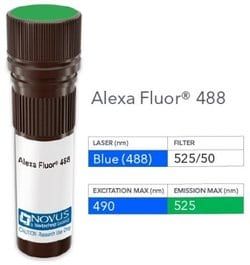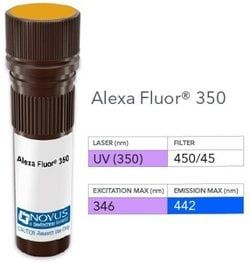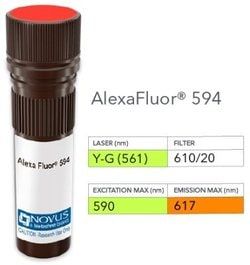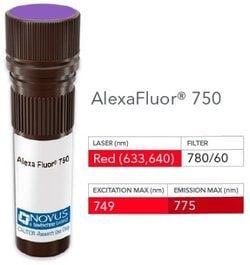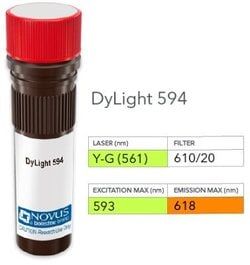Cytokeratin 8/18 Antibody (C-43 + DC10), DyLight 350, Novus Biologicals™
Manufacturer: Novus Biologicals
Select a Size
| Pack Size | SKU | Availability | Price |
|---|---|---|---|
| Each of 1 | NB007566-Each-of-1 | In Stock | ₹ 55,847.50 |
NB007566 - Each of 1
In Stock
Quantity
1
Base Price: ₹ 55,847.50
GST (18%): ₹ 10,052.55
Total Price: ₹ 65,900.05
Antigen
Cytokeratin 8/18
Classification
Monoclonal
Conjugate
DyLight 350
Formulation
50mM Sodium Borate with 0.05% Sodium Azide
Gene Symbols
KRT8
Immunogen
Keratin preparation from a human carcinoma (C-43); PMC-42 human breast carcinoma cells (DC10)
Quantity
0.1 mL
Research Discipline
Cancer, Cell Biology, Cellular Markers, Phospho Specific
Test Specificity
Cytokeratin 8 (CK8) belongs to the type II (or B or basic) subfamily of high molecular weight cytokeratins and exists in combination with cytokeratin 18 (CK18). This monoclonal antibody cocktail recognizes all simple epithelia including glandular epithelium, for example thyroid, female breast, gastrointestinal tract, respiratory tract, and urogenital tract including transitional epithelium. All adenocarcinomas and most squamous carcinomas are positive but keratinizing squamous carcinomas are usually negative. This antibody is useful in demonstrating the presence of Paget cells; there is very little keratin 18 in the normal epidermis so only Paget cells are stained. Immunohistochemical staining with this monoclonal antibody is indistinguishable from that obtained with monoclonal antibody 5D3.
Content And Storage
Store at 4°C in the dark.
Applications
Western Blot, Flow Cytometry, Immunohistochemistry, Immunohistochemistry (Paraffin), Immunofluorescence
Clone
C-43 + DC10
Dilution
Western Blot, Flow Cytometry, Immunohistochemistry, Immunohistochemistry-Paraffin, Immunofluorescence
Gene Alias
CARD2, CK8, CK-8, CYK8cytokeratin 8, Cytokeratin-8, K2C8, K8cytokeratin-8, keratin 8, keratin, type II cytoskeletal 8, keratin-8, KO, Type-II keratin Kb8
Host Species
Mouse
Purification Method
Protein A or G purified
Regulatory Status
RUO
Primary or Secondary
Primary
Target Species
Human
Isotype
IgG1 κ
Related Products
Description
- Cytokeratin 8/18 Monoclonal specifically detects Cytokeratin 8/18 in Human samples
- It is validated for Immunohistochemistry, Immunohistochemistry-Paraffin.

